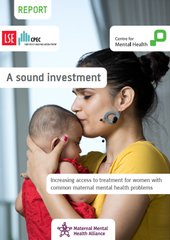Untreated perinatal mental health problems have a wide range of effects on the mental and physical health of women, their babies, partners and loved ones, meaning insufficient support is a major public health concern.

develop a mental illness during pregnancy or first postnatal year

known costs of perinatal mental health problems per year's births in the UK

is a leading cause of maternal death during pregnancy and the first postnatal year
Perinatal mental health problems can cause intense, debilitating, isolating and often frightening suffering for women.
Perinatal mental health problems can have a long-term impact on a woman’s self-esteem and relationships with partners and family members.
Perinatal mental health problems can have an adverse impact on the interaction between a mother and her baby, affecting the child’s emotional, social and cognitive development.
In severe cases, perinatal mental health problems can be life-threatening. In the UK, suicide is one of the leading causes of maternal death in the first postnatal year.
Research commissioned by the MMHA shows that the economic cost to society of untreated perinatal mental health problems far outweighs the cost of providing appropriate services:

MMHA Pdf, 1.4mb
Published: February 2022
Commissioned by the MMHA, this independent report presents evidence on the costs and economic consequences of different service options, focusing on evidence-based low-intensity treatment, if unmet common mental health problems are addressed within routine health services provided to women during the perinatal period.

MMHA Pdf, 2.0mb
Published: February 2022
Commissioned by the MMHA, this policy briefing summarises the latest maternal mental health-related economic research from LSE and the case for action. It explores the current policy context for perinatal mental health care and how the case for investment can be implemented in practice.
If perinatal mental health problems were identified and treated quickly and effectively, these serious and often life-changing costs could be minimised.